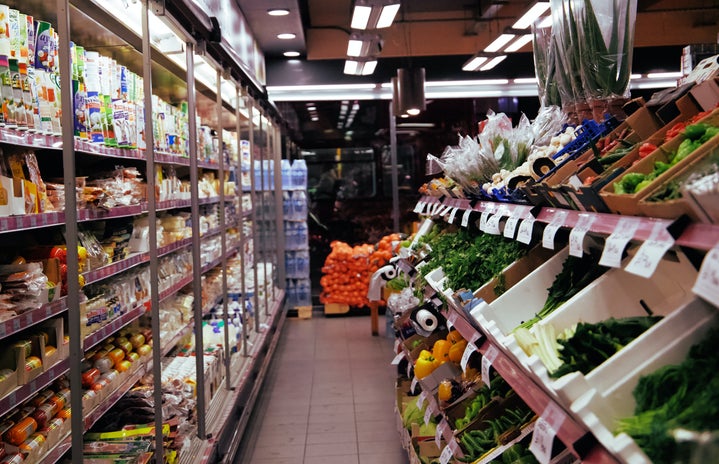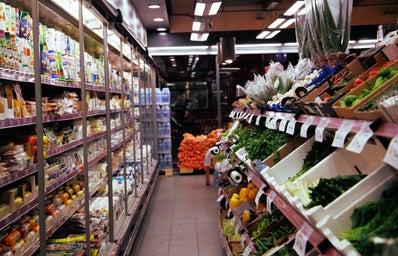More than 20% of UW students were food insecure in 2019. That’s one in five students, pre-pandemic. This statistic has most definitely increased in the past four years, but there is no data to confirm the prevalence of food insecurity on the University of Washington Seattle campus to date. As we conclude this quarter, I reflect upon my own education and professional experience in food systems, how the intricacies of food impact our daily lives, and grapple with methods to improve the aging food-related processes that lead to inequitable health outcomes.
I worked for Trader Joe’s for 4.5 years, starting at the ripe age of 16 years up until this past October. I remember turning 18 and being eager to begin operating the cash register—an exciting role in the retail world. My excitement quickly faded when I started noticing how many people would count their coins to pay for groceries. Or, checking out families whose SNAP cards would be maxed out for the month and having to deny their groceries. It was early 2021, and our country had begun feeling the impact of COVID-19 and inflation. Food insecurity was a direct result, which increased the frustrations of customers and overall pessimism in our nation’s decision-making. Despite the ever-worsening food inaccessibility and barriers, Trader Joe’s was still dumping out thousands of dollars worth of food daily. Some of our spoils were given to a local food bank, but, due to carelessness and oblivion, excess food was thrown into the landfill. I would leave work, grappling with potential solutions to our escalating food waste in the grocery setting and pressing food insecurity issues in my community.
To no avail, I moved to Seattle and began studying Public Health at UW, with one of my minors in Nutrition. As I continue to navigate these courses, the consistent discussions of food security and food waste stick out in my mind. The data I unpack each class does not lie: if food waste were a country, it would be the third largest greenhouse gas emitter; yet, 17 million Americans were food insecure in 2022.
Throughout the years, I become more enraged at how policies have not shifted drastically at the federal level to address these issues. In sum, my undergraduate academic career has focused on the notion that socio-environmental factors play a pivotal role in specific health outcomes and life expectancy. One huge factor is food—production, access, and regulations—all of which can contribute to an entire community’s quality of life without their knowledge. The effects of food also disproportionately impact historically marginalized groups and rural areas, which perpetuates the prevalence of disease. Working towards equity and ending the existing cycle of poor health outcomes is impossible when changes are not made to improve the traditional food system in place.
Now, I redirect my strong emotions to my responsibilities as the Social Media Coordinator and On-site Manager for the UW Food Pantry. After chatting with students and faculty alike about their experience with food daily, I stare at statistics that further underpin these stories. This autumn, the UW Food Pantry served 600+ Huskies weekly, which is over double the number of guests from autumn quarter of 2022. We are working tirelessly to bolster food security on campus for an increased number of visitors while working with a tight budget. We need the support of the community to help improve our role in UW’s mini-food system, reducing the impact of food waste and accessibility on campus.
Here’s what you can do to help:
- Educate. Learn more about the burden of food insecurity on campus, in the state of Washington, and globally. Hunger is a pressing issue that worldwide organizations have crafted the solution to but do not have the fiscal backing to follow through and end hunger for all.
- Find out more about future legislation. The Food Research and Action Center posts proposed state and federal bills, demonstrating the future of the nation’s food system. Food impacts each American, and it’s crucial that we understand the policies being implemented on a large scale.
- Host a Food Drive. If your organization wants to do more community outreach, suggest a food drive! The UW Food Pantry supplies bins and marketing materials, as well as arranges pick-ups and drop-offs. This is a great way to bring your organization, place of work, or council together for a cause.
- Join RSOs that work towards addressing food-related issues, such as the ASUW Student Food Cooperative, the UW Farm Dirty Dozen, or even the Resident Student Community Association’s Students Expressing Environmental Dedication (SEED) organization. There are plentiful opportunities at UW to learn more about food systems and make a tangible difference in the lives of Huskies and Seattleites alike.
- Volunteer. Reach out to local food banks near you or email uwpantry@uw.edu to find out more about opportunities at the UW Food Pantry. There are in-pantry shifts and gleaning shifts, where volunteers collect near-expired food from on-campus dining facilities to distribute at the Pantry. Time and effort are necessary.
- Donate to Any Hungry Husky. The UW Food Pantry is completely self-sufficient with 44% of the annual budget coming from Any Husky Hungry donations. With such limited purchasing power, the Pantry works tirelessly to build partnerships, glean from on-campus dining, and sustain relationships with other resources at UW. Donations are essential to keep the Pantry open and stocked each quarter.


